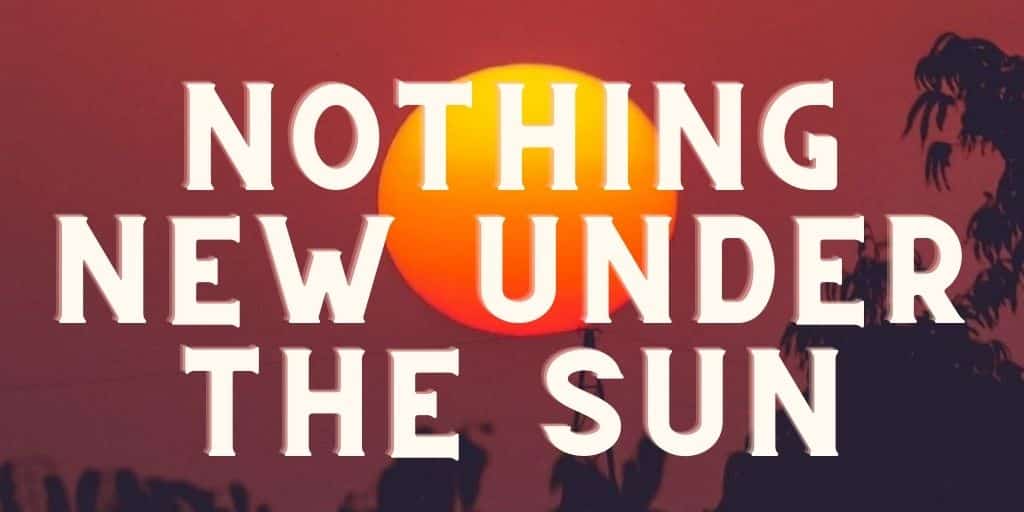What Is Has Been Before and Will Be Again
'At that place is zip new under the dominicus' is one of those idioms that should take come from Shakespeare but does not. It is from that other peachy source of idioms – the Bible.
'In that location is nothing new under the sun' is one of the most important and powerful lines in the beautiful poetry of Ecclesiastes in the Sometime Testament:
What has been will exist again,
what has been done will be washed again;
there is cipher new under the sun.
Or even more than cute, in the Jacobean linguistic communication of the King James Bible:
The thing that hath been, it is that which shall be; and that which is done is that which shall be done: and there is no new matter under the sunday.

There'southward nothing new under the sun… is in that location?
Ecclesiastes is a sermon by someone known as 'the preacher.' He talks about life in general but in this part, Ecclesiastes 1: 9, he makes the point that in that location is nothing new in this world. He uses the phrase 'under the sun,' specifying the endeavours of living homo beings on Globe. Whatsoever y'all may encounter, yet new or revolutionary information technology may seem to you, you can exist sure that it's not new.
Shakespeare knew that, and he conspicuously liked that chip of Ecclesiastes. Ane can see that he part quotes from information technology in Sonnet 95, beginning it with 'If in that location exist goose egg new,' and continuing with his main thought for the sonnet, playing effectually with the Ecclesiastes phrase, using 'courses of the dominicus' to refer to 'days.'
If there exist zero new, but that which is
Hath been before, how are our brains beguil'd,
Which labouring for invention bear amiss
The second burthen of a former child.
Oh that record could with a backward look,
Even of five hundred courses of the sun,
Show me your epitome in some antique book,
Since heed at start in character was done,
That I might see what the old world could say
To this composed wonder of your frame;
Whether we are mended, or where better they,
Or whether revolution be the aforementioned.
Oh sure I am the wits of one-time days,
To subjects worse have given admiring praise.
Ecclesiastes 1 could well be a commentary on Shakespeare'due south writing career. Shakespeare knew that however creative he wanted to be, everything he wrote nearly came from somewhere else – someone had dealt with it earlier him, and in well-nigh cases information technology was impossible, even for Shakespeare, to know where it had originated. That was true for all his plays.
For case, the wonderful tragic story of Romeo and Juliet. It is so modern (to Shakespeare's fourth dimension) and refreshing, that we think it came from the slap-up creative mind of Shakespeare. Just it did not. Shakespeare lifted the whole story almost intact from someone else, who took it from someone who had written a version of information technology before, and that writer had done the same. We tin trace it back through several versions to the story of Pyramus and Thisbe in Ovid's Metamorphasis, just Ovid must have got it from somewhere. Unfortunately, we lose track of it with him.
Each of those writers took that story and changed it a bit. During the retellings the names of the characters morphed into 'Romeo' and 'Juliet,' the names Shakespeare also used. When Shakespeare took the story upwards as something to adapt for the phase he applied his special dramatic and poetic genius to it, and we know the remainder – the play is immortal. Merely the story wasn't new.
And and so, the American composer, Leonard Bernstein, took it up and so nosotros have the musical, Westside Story. All he did to the story was change the names of the star-crossed lovers. Here once more, nosotros have a wonderful story, only it is the same story, going back to Ovid, and his sources earlier him. It demonstrates Ecclesiastes point well-nigh there being nil new under the lord's day.
Even in science and technology, where we see incredible advances 24-hour interval by day, nothing tin can be new: every new thing is built on something that has gone before. For example, nosotros think of Charles Darwin's theory of development as something startlingly new. In one sense it was because of the books he wrote but his grandfather was already exploring the concept before Darwin was born, and, also, there were other scientists working on it. Similar Shakespeare though, Charles Darwin was the one who wrote the definitive version.
When someone says 'there is cipher new under the sun' they are more than or less maxim, 'I've heard that many times before,' or 'it always turns out that style,' or 'I've seen everything,' or something along these lines.
Source: https://nosweatshakespeare.com/quotes/famous/nothing-new-under-the-sun/
0 Response to "What Is Has Been Before and Will Be Again"
Post a Comment